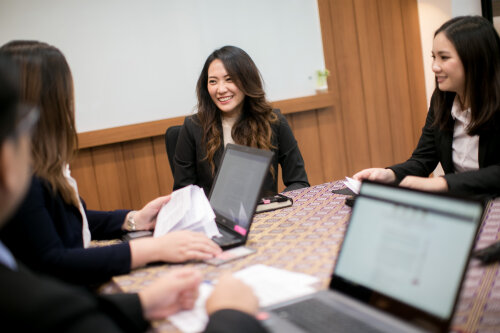Best Collaborative Law Lawyers in Don Mueang
Share your needs with us, get contacted by law firms.
Free. Takes 2 min.
Free Guide to Hiring a Family Lawyer
List of the best lawyers in Don Mueang, Thailand
Thailand Collaborative Law Legal Questions answered by Lawyers
Browse our 1 legal question about Collaborative Law in Thailand and read the lawyer answers, or ask your own questions for free.
- Divorce rights and obligations
- I am Dutch and married for 13 years with a Thai wife. Over the past 10 years we lived outside Thailand as I was an expat. From our marriage we have a daughter of 10 years and is studying at the international school. We have a house in Chiang Mai... Read more →
-
Lawyer answer by SORASAK LAWFIRM
Dear Sir, Subject: Family, Divorce & Separation, Contract and Collaborative Law Thanks you for your email received today. Incase of foreigner husband and Thai wife under Thai law, the marriage property will be forced by hasband's country law accept that...
Read full answer
About Collaborative Law in Don Mueang, Thailand
Collaborative Law is an alternative dispute resolution method gaining recognition in Don Mueang and throughout Thailand, particularly for matters involving family law such as divorce, child custody, and property settlements. Unlike traditional litigation, Collaborative Law encourages both parties to work together, with the support of specially trained lawyers, to reach a mutually satisfactory agreement outside of court. This approach can be less adversarial, more cost-effective, and often leads to a healthier long-term outcome for all involved, especially when children or ongoing business relationships are concerned.
Why You May Need a Lawyer
People in Don Mueang may seek legal help with Collaborative Law in various situations. Common scenarios include marital separations where both parties wish to avoid contentious court proceedings, disputes over child custody or visitation, disagreements on division of property following a divorce, and business partnership dissolutions where both sides prefer an amicable split. A lawyer trained in Collaborative Law can provide critical support by guiding negotiations, ensuring all legal implications are considered, and protecting your best interests while working towards a cooperative solution.
Local Laws Overview
Thailand’s legal system recognizes and increasingly supports alternative dispute resolution methods, including Collaborative Law, particularly through the Family Court and Mediation Center system. In Don Mueang, the process is generally private and voluntary, with both parties signing a participation agreement stipulating that they will negotiate in good faith and that their attorneys are disqualified from representing them in court should negotiations fail. Matters such as divorce and child custody must still meet statutory requirements set out in the Thai Civil and Commercial Code, and any agreement reached must not contravene public policy or the best interests of involved parties. Legal professionals facilitating Collaborative Law in Don Mueang are required to follow both ethical standards and best practices to ensure fair and equitable negotiations.
Frequently Asked Questions
What types of cases can be resolved through Collaborative Law in Don Mueang?
Collaborative Law is most often used for family law matters such as divorce, child custody, visitation, and property settlement. It can also be applied to business disputes and other civil matters where both parties are willing to negotiate.
Is Collaborative Law legally binding in Thailand?
Yes, agreements reached through Collaborative Law can be made legally binding subject to court approval, especially in family law matters such as divorce, child support, and custody.
How does Collaborative Law differ from mediation in Don Mueang?
In Collaborative Law, both parties are represented by their own specially trained lawyers throughout the process, whereas mediation often involves a neutral third party mediator without individual legal representation.
What are the advantages of using Collaborative Law over traditional litigation?
The main benefits include greater privacy, reduced costs, less emotional stress, more control over the outcome, and preservation of relationships, especially when children or ongoing business dealings are involved.
Is participation in Collaborative Law voluntary?
Yes, both parties must agree to participate voluntarily. Either side may withdraw from the process at any time, though this typically triggers certain provisions in the participation agreement regarding representation.
Can Collaborative Law be used if there is a significant power imbalance or history of domestic violence?
Collaborative Law is generally not recommended in cases involving domestic violence or significant power imbalances, as the process relies on open, voluntary cooperation. Other legal protections may be more appropriate in such situations.
What happens if the Collaborative Law process fails?
If either party decides to withdraw, both collaborative lawyers are disqualified from representing their clients in traditional court litigation. New legal counsel must be obtained if the dispute moves to court.
Do I need a lawyer who is specifically trained in Collaborative Law?
Yes, it is highly recommended to engage a lawyer who has received formal training in Collaborative Law to ensure proper handling of negotiations and adherence to the process’s ethical standards.
How long does the Collaborative Law process usually take?
Timelines can vary depending on the complexity of the issues and the parties’ willingness to cooperate, but it is generally faster than traditional court proceedings.
Can agreements reached through Collaborative Law be enforced?
Yes, once both parties agree and the agreement complies with Thai law, it can be submitted to the court for approval and enforcement.
Additional Resources
Those seeking information or assistance with Collaborative Law in Don Mueang may consider contacting the following organizations:
- The Don Mueang District Office for legal aid and general advice
- The Thai Bar Association for referrals to trained Collaborative Law professionals
- The Family Court or Mediation Center located in Bangkok for guidance on family law matters
- The Lawyers Council of Thailand for information on qualified Collaborative Law practitioners
- Community Legal Clinics, which sometimes offer free or low-cost consultations
Next Steps
If you are considering using Collaborative Law to resolve a dispute in Don Mueang, your first step should be to consult a lawyer who is trained and experienced in this method. Be prepared to discuss your goals, current situation, and willingness to negotiate in good faith. Gather all relevant documents, including any existing agreements, financial statements, or communication records related to the dispute. During your initial consultation, ask about the lawyer's experience with Collaborative Law, the process, estimated costs, and expected timeline. Proceed only if you feel comfortable with the collaborative approach and if the other party is also agreeable. This initial groundwork can lay the foundation for a successful and amicable resolution to your legal matter.
Lawzana helps you find the best lawyers and law firms in Don Mueang through a curated and pre-screened list of qualified legal professionals. Our platform offers rankings and detailed profiles of attorneys and law firms, allowing you to compare based on practice areas, including Collaborative Law, experience, and client feedback.
Each profile includes a description of the firm's areas of practice, client reviews, team members and partners, year of establishment, spoken languages, office locations, contact information, social media presence, and any published articles or resources. Most firms on our platform speak English and are experienced in both local and international legal matters.
Get a quote from top-rated law firms in Don Mueang, Thailand — quickly, securely, and without unnecessary hassle.
Disclaimer:
The information provided on this page is for general informational purposes only and does not constitute legal advice. While we strive to ensure the accuracy and relevance of the content, legal information may change over time, and interpretations of the law can vary. You should always consult with a qualified legal professional for advice specific to your situation.
We disclaim all liability for actions taken or not taken based on the content of this page. If you believe any information is incorrect or outdated, please contact us, and we will review and update it where appropriate.









